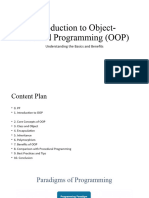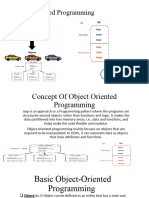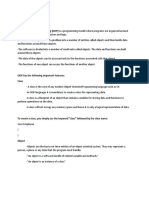Object-Oriented Programming (OOP) Concepts
1. Introduction:
OOP is a programming paradigm based on the concept of objects that contain data and methods.
2. Key Concepts:
- Class: Blueprint for objects
- Object: Instance of a class
- Encapsulation: Wrapping data and methods together
- Abstraction: Hiding internal details
- Inheritance: Reusing properties from parent classes
- Polymorphism: Same operation behaves differently on different classes
3. Example in Java:
class Animal { void sound() { System.out.println('Animal sound'); } }
class Dog extends Animal { void sound() { System.out.println('Bark'); } }
class Main { public static void main(String[] args) { Animal a = new Dog(); a.sound(); } }
4. Example in C++:
class Shape { public: virtual void draw() { cout << 'Drawing'; } };
class Circle: public Shape { public: void draw() { cout << 'Circle'; } };
5. Benefits of OOP:
- Modularity
- Code reusability
- Easy to maintain and scale
- Security via encapsulation
6. OOP vs Procedural Programming
7. Real-world applications of OOP (banking systems, GUIs, simulations)
Object-Oriented Programming (OOP) Concepts
1. Introduction:
�OOP is a programming paradigm based on the concept of objects that contain data and methods.
2. Key Concepts:
- Class: Blueprint for objects
- Object: Instance of a class
- Encapsulation: Wrapping data and methods together
- Abstraction: Hiding internal details
- Inheritance: Reusing properties from parent classes
- Polymorphism: Same operation behaves differently on different classes
3. Example in Java:
class Animal { void sound() { System.out.println('Animal sound'); } }
class Dog extends Animal { void sound() { System.out.println('Bark'); } }
class Main { public static void main(String[] args) { Animal a = new Dog(); a.sound(); } }
4. Example in C++:
class Shape { public: virtual void draw() { cout << 'Drawing'; } };
class Circle: public Shape { public: void draw() { cout << 'Circle'; } };
5. Benefits of OOP:
- Modularity
- Code reusability
- Easy to maintain and scale
- Security via encapsulation
6. OOP vs Procedural Programming
7. Real-world applications of OOP (banking systems, GUIs, simulations)
























































